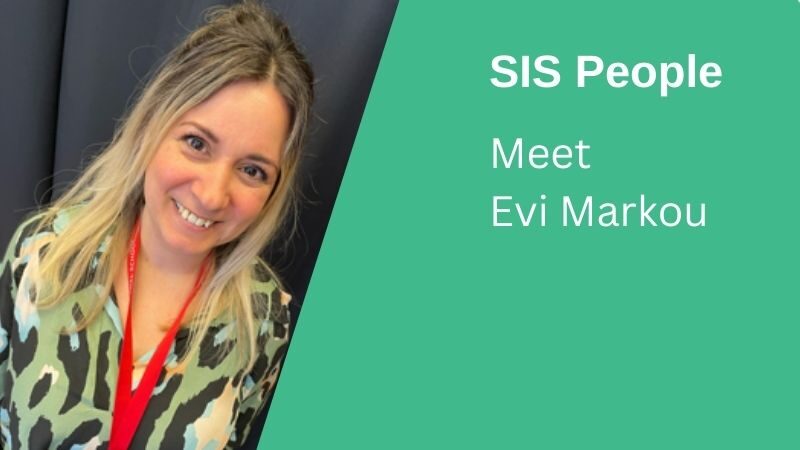Evi Markou
Learning Support Teacher
Evi Markou is unusual among the profiles we have shared in that she is not the partner of a Swede returning home, or a Swede herself who has enticed her partner to Stockholm. Where she is not unusual, is that a relationship with SIS that started with an afternoon of teaching as a substitute has blossomed into a seven-year association, and shows no sign of ending any time soon.
So how did she and her fellow-Greek partner end up in the Nordics? ‘We were in Greece at the time of the country’s economic crisis that flowed from the 2008 global crash. We were open to a move, and then my husband, who is an environmental scientist got two offers to develop his career. One was in Lancaster in the UK, the other in Stockholm. I had lived in the UK before so the novelty – and to my mind more agreeable climate – of Scandinavia won the day.’
That period in the UK was when Evi obtained her Master’s Degree in Culture, Language, and Identity in Education from Goldsmiths College, and ultimately her PhD in the Sociology of Education from UCL. Her research background has seen her create teacher training materials in areas such as inclusion, intercultural, migrant, and refugee education. Her particular interest in these areas was fuelled by the experience of her grandmother who fled Turkey for Greece during the forced population exchange between the two countries in 1923.
Significant challenge
Transporting her academic achievement to her new home was to prove a significant challenge however. Evi found the language barrier particularly difficult. Though as we all know Swedish capability with English is generally good, research work – particularly in the Social Sciences – demanded a higher level of accomplishment in Swedish than Evi had to offer. As a result, she struggled to find openings to pursue an academic career.
As an alternative, Evi decided to enter the practical world of the classroom. It was not entirely alien to her: ‘During my years in London I taught at a Greek community school, but SIS was my first mainstream classroom teaching role. I also have experience of teaching in a University context – particularly in teacher-training at undergraduate and master’s levels.’
It wasn’t long before an opportunity arose that would take Evi into her current Learning Support role. ‘I was invited to take on a role supporting an autistic student, and I felt that I had enough experience and the necessary skills to do justice to the role and to the student, so I said yes.’
How does learning support work within the classroom environment? ‘I try to work with all the students in a class not just those with a particular need. We don’t want students to feel conspicuous or singled out, their self-esteem is important to them. I’ll agree strategies with subject teachers so that we can provide the best learning environment for a student. We’ll also work to create an awareness of learning neurodiversity to help students recognise that there are different ways of learning and different measures of accomplishment.’
Learning support may be provided over a number of years while a child is in the School, and transitions between Primary and Middle School and Middle to Upper School are carefully managed. ‘I’ll meet with teachers and other learning support staff to make sure there is a full understanding of a student’s particular needs, how they have been supported and the support they will need going forward. We’ll do that at the start of the year and then review and refine on an individual basis as the terms progress.’
Ultimately, the hope is that the student develops the confidence and capability where their need for learning support becomes nil or minimal. ‘We always aim to have an exit point’ Evi explains, ‘but with our very fluid population in the School a student can arrive and leave and have some degree of support throughout. We aim to equip them with those tools necessary to navigate the educational system in the time they are with us so that SIS offers them an optimal learning environment.’
Impressed
Evi is certainly making the most of her time at SIS. ‘I was impressed from the beginning with the School’s commitment to the students and to providing the learning support they need. I also found SIS wonderfully welcoming, and have discovered some great colleagues.
‘I want to see us develop as a “brave community” – an environment where we are comfortable listening to student voices, especially those in the margins, and where we are all open and accepting of the learning and cultural diversity in the School. Of course, the soul of that is there already – it’s not about change, it’s about doing more with intentionality and collective action.’









